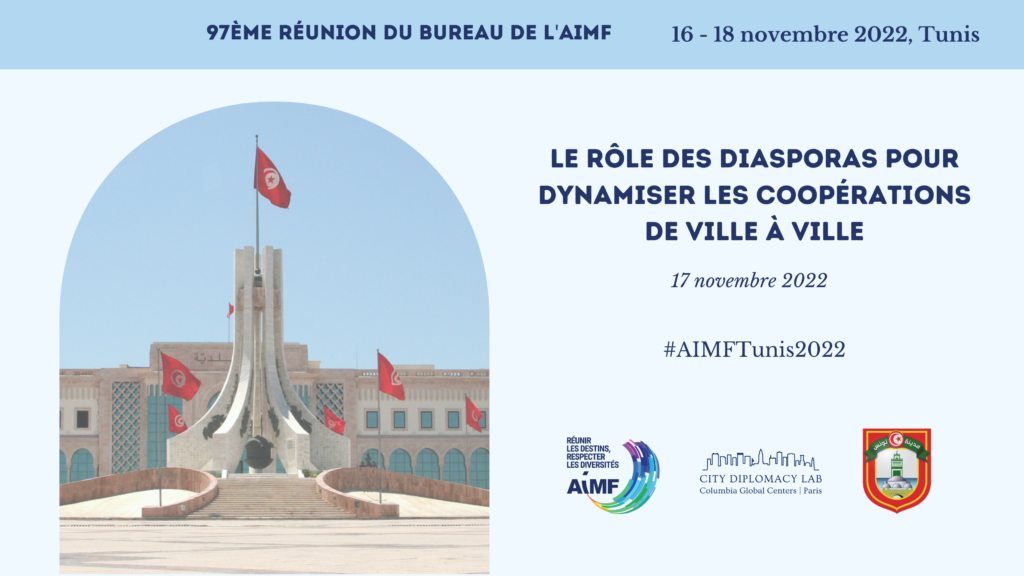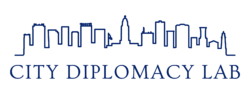-
City-to-city cooperation and the 15-minute city
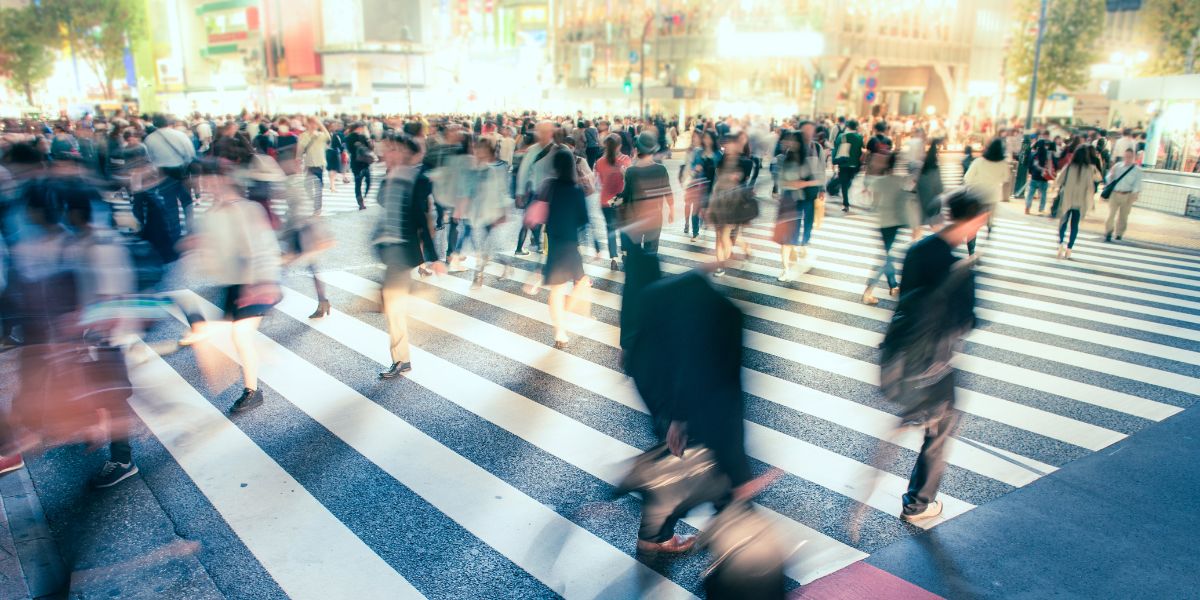
Member of the City Diplomacy Lab’s Scientific Committee
The conception of an urban alternative: the 15-minute city
At the beginning of the 2000s, an all-new concept took over the reflection on cities and urban organization: the “smart city” concept. This technocentric concept promised a technological shift, a utopian intelligence where new technologies were supposed to optimize and rationalize hyper-connected cities. In 2010, it became a worldwide craze among elected representatives, town planners, and others discussing smart grids and autonomous vehicles.
During this time, I began to take my place in the debate, reminding people of the need to think about the people who live in cities. Questioning urban functioning through the lens of my expertise in complex systems, I knew that technology could not be the solution to urban malfunctioning. Broad and complex cities’ problems couldn’t be “just monitored.”
At the same time, environmental concerns and environmental crises skyrocketed while people’s mental health was declining – especially in big cities. It became clear that cities did not need more technology but more humanism, happiness, and oxygen.
How can cities and territories be transformed for an effective and sustainable environmental transition? How can we rethink the functioning of urban areas? How can we ease people’s lives?
To tackle those challenges, I searched for an urban model that is anchored in modernity by its sustainability and humanity, not its technology. It led, in 2016, to the concept of the 15-minute city, a city model that is today known all around the world.
It proposes a new form of urban organization based on proximity. The idea is to enable each inhabitant to satisfy his essential needs (housing, work, access to healthcare, supplies, learning, and self-fulfillment) within 15 minutes of his home by active modes of transport (walking, cycling). Proximity is making people’s lives easier, more pleasant, less stressful and, at the same time, reduces the carbon footprint of urban systems. It’s an alternative to a metropolitan lifestyle that many people suffer from: time-consuming commutes, CO2 emissions, the omnipresence of the car in the urban space, air pollution, isolation, unhappiness, etc.
Entering the world stage
Fortunately, this urban model intrigued and then interested the mayor of Paris, Anne Hidalgo. In 2019, we started working on the implementation of the model in the French Capital.
On the one hand, the 15-minute city went from theoretical to very practical: What could be the “Paris du Quart d’Heure”? How should we modify the current city organization? Can we close some roads to car traffic?
On the other hand, the 15-minute city concept went from very local to global. Indeed, the concept is a proposal designed to meet the three urges our planet is facing: the ecological/environmental challenge, the economic challenge, and the social one. A few years earlier, the COP21 in Paris came to a clear conclusion: cities have become the main emitters of CO2, particularly through transport. With the support of the mayor of Paris, the proposal of the 15-minute city began to be discussed within the C40, a global network of nearly 100 mayors of the world’s leading cities that are united in action to confront the climate crisis. The C40 started having an interest in the concept, given that mayors were all very concerned about the future of their cities: we discussed the coming change in cities and lifestyles, what is acceptable and what is not, and the differences between countries.
And then… the pandemic of COVID-19 happened and so did the lockdowns all over the world. Lockdowns kind of accelerated the effective implementation of the 15-minute city but in a constrained way. The crisis also revealed how much cities were not resilient and unsuited to local living. The imposed proximity led to the development of exceptional measures: new bicycle lanes, temporary terraces in car parks, and new local services for healthy food and health.
In this context, the answers provided by the implementation of “15-minute city” solutions were unanimously approved and the C40 even endorsed the concept as part of a post-covid policy strategy. It has also been recognized by the IPCC as a guideline to tackle the environmental crisis in cities. It obtained the support of the World Health Organization for promoting a healthy lifestyle through active travel and low air pollution. United Cities and Local Governments, UCLG, has integrated it into its Pact for the Future. UN-HABITAT promotes it as a key element in the new urban agenda and the achievement of the SDGs and gave its 2022 “Scroll of Honour” to the 15-Minute city as a tribute for the improvement of the quality of life of citizens.
All over the world, the 15-minute City was recognized as a way to transform cities, step by step, into more resilient and happy cities. The movement has not stopped growing since and a lot of worldwide cities are reconsidering their city plan to integrate proximity: Roma, Portland, Nantes, Melbourne, Milano, Mulhouse, Nantes, Toulouse, Buenos Aires, Busan, Sousse, Scotland…
City diplomacy, pursuing a constructive debate
Due to the crisis, the interest in this new urban organization peaks, and I am pleased that this urgent and needed debate is now open. The appetite for more liveable, people-oriented cities is driving a surge of interest in the ‘15-Minute city’. It is clear that diplomacy between cities played a key role in its propagation and adoption.
After the emergency of the pandemic, we are entering a new phase of cooperation between cities around the idea of the 15-minute city. Indeed, with the support of the C40, the UCLG, and UN-Habitat, the Chaire ETI has just launched in June 2023 the “Global Observatory of Sustainable Proximities”. This global platform aims to support the implementation of proximity approaches in cities worldwide with the development of official measures and indicators. This observatory will be a global center for knowledge sharing, as much as a global network to support cities in implementation. It will convey good practices, good ideas, and federate cities.
This “Global Observatory of Sustainable Proximities” is the result of a long-term project which we all undertook together. While the idea and concept are my own, the cooperation between the cities has played a big part in making it popular today. I am convinced that we will continue in this direction with this new space for dialogue and that it will enable us to continue transforming our cities for the better.
-
The role of city diplomacy in crisis management

Everywhere in the world, cities are suffering the harshest consequences of this age’s multiple crises.
Due to armed violence and climate change, as well as growing inequalities and health crises, the resilience and well-being of cities are challenged on a daily basis. It is precisely these common challenges that spark the determination of cities to join forces regionally and globally to devise and implement prompt and effective solutions. City diplomacy thus becomes an irreplaceable tool for crisis management.
The City Diplomacy Lab joins forces with CItés Unies France, United Cities and Local Authorities (UCLG), and PLATFORMA to highlight the potential and challenges of city diplomacy in such contexts.
Hosted by the French House of Representatives (Assemblée Nationale) on July 3, this day-long workshop will be opened by former President of France François Hollande. A distinguished lineup of mayors, representatives of international organizations and NGOs, and academics will discuss the potential of city diplomacy in times of multiple crises, outlining avenues for addressing their lingering obstacles.
The event is in French and in person. To attend, fill out this form, to be emailed to Simone Giovetti (s.giovetti@cites-unies-france.org) and Mélanie Sabot (m.sabot@cites-unies-france.org).
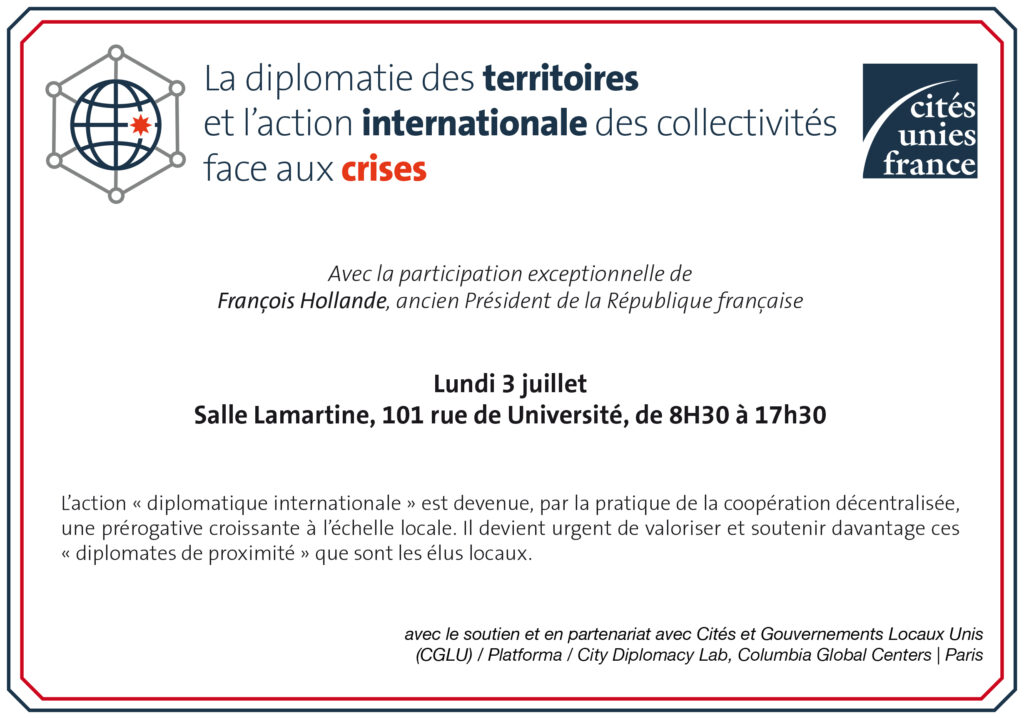
-
Cities and Climate Solutions | Food
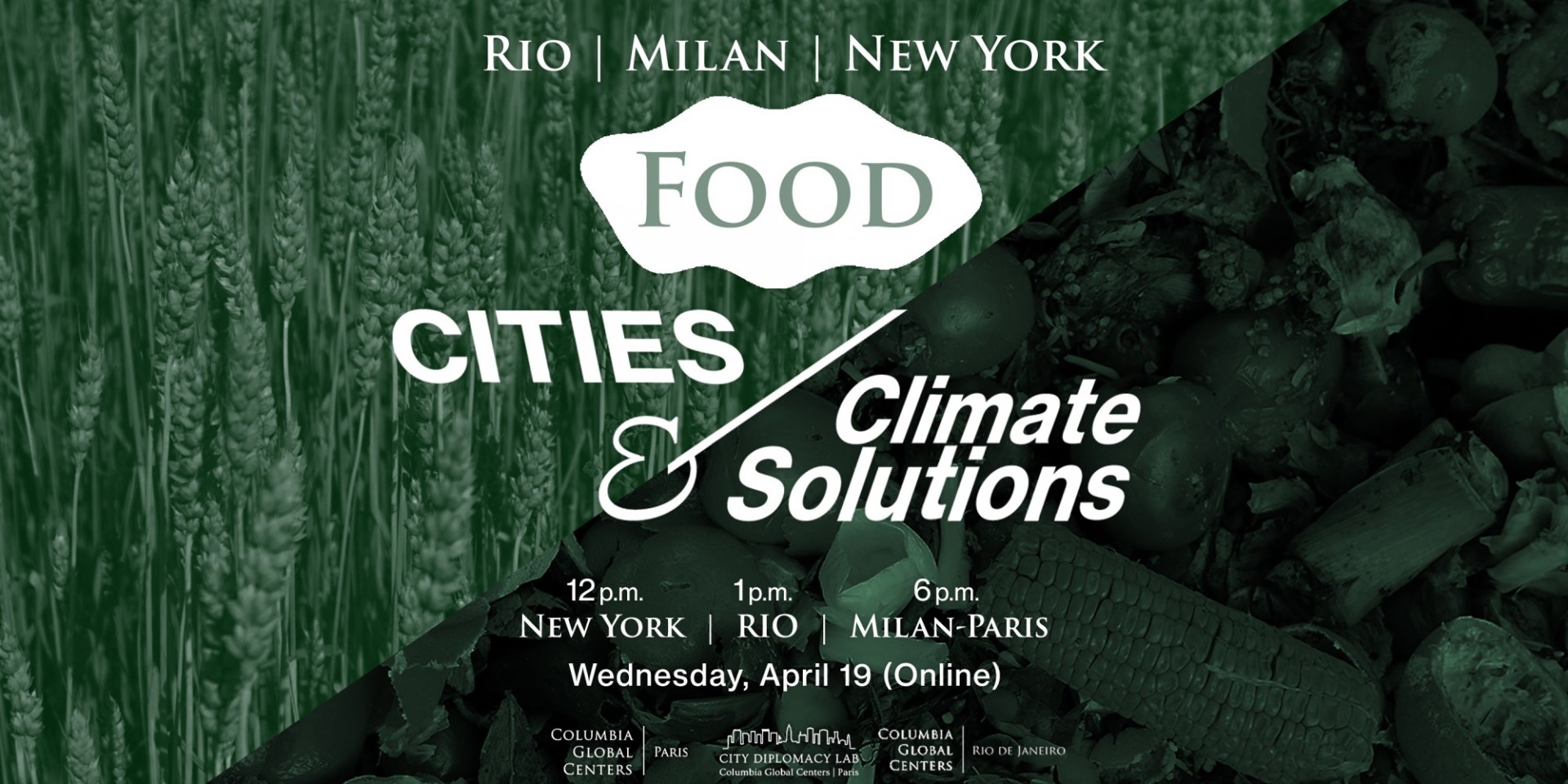
April 19, 2023 | Online event | 12:00 p.m. (New York) | 1:00 p.m. (Rio de Janeiro) | 6:00 p.m. (Paris) | In English
In the face of the climate crisis, cities across the world are emerging as integral problem-solvers in the development of an effective, multi-layered response. This webinar aims to discuss some of the most impactful and sustainable urban food safety and security actions. It will take the form of an online dialogue between city officials from New York City, Rio de Janeiro, and Milan and center on how cities design and manage their food policies. The discussion will be moderated by City Diplomacy Lab Director Lorenzo Kihlgren Grandi.
The webinar is the second in a series of three entitled “Cities and Climate Solutions.” The series celebrates the leadership of cities and provides inspiration for the thousands of cities and local governments around the world committed to shaping the global response to climate change.
Cities and Climate Solutions is a collaboration between the City Diplomacy Lab and Columbia Global Centers | Paris. This event is also co-sponsored by Columbia Global Centers | Rio de Janeiro.
Speakers:
Rio de Janeiro | Thalyta Ferraz is an internationalist with experience in managing research projects internationally funded and, since May 2022, stepping forward as a local diplomacy advisor at the City of Rio de Janeiro. As part of the Rio’s International Department office, she has been advocating for public policies, development, and rights-based international agenda, along with international organizations and cities’ networks, such as C-40, UCLG, UCCI, IOPD, and the Milan Pact, for which she was directly involved in the conceptualization and organization of its global forum hosted in Rio in 2022. Thalyta holds an MA in International Relations from the Pontifical Catholic University of Rio de Janeiro (2015). In 2020, she concluded a four-month professional advancement fellowship at the MGG Academy (DIE/Germany), shifting areas from project to knowledge management, seeking shared problem-solving methods, conflict mediation, and supporting the co-creation, diffusion, and application of knowledge between organizations.
New York | Milagros de Hoz currently serves as a Senior Policy Advisor at the Mayor’s Office of Food Policy, where she is responsible for advancing MOFP’s work in the intersection of food, environment, and climate. She works across City agencies and with local, state, and regional leaders to advance sustainable and low-carbon food initiatives and represents NYC in national and international coalitions that focus on these efforts. Milagros is also responsible for reporting on progress towards the goals set in Food Forward NYC, the city’s ambitious 10-year food policy plan. Prior to joining MOFP, Milagros worked as a research scientist at the Office of Research and Policy Innovation at the NYC Department of Social Services. Previously, Milagros focused on environmental justice, leading community-based participatory research initiatives, and managing a vast and varied portfolio of environmental health programs. Milagros received a Bachelor’s in Biology, with a concentration in plant genetics from the University of Buenos Aires, and a Master’s in Environmental Policy and Sustainability Management from the New School.
Milan | Elisa Porreca is a Food Policy officer at the City of Milan. She graduated in Linguistic and Cultural Mediation and then studied food system issues at the Master Food & Society. She started working for the Municipality of Milan in 2017, focusing on a range of issues for the Milan food system, in particular the reduction of food waste and food aid systems answering to food poverty. In parallel, she contributed to the drafting and implementation of European projects on food policies and the exchange of knowledge with international cities active on sustainable food systems. She is now serving as project officer for the European Food Trails project.
Watch the recording
About Columbia Global Centers | Paris
For nearly sixty years, Columbia University students and faculty have come to study, teach, or pursue their research at Reid Hall, an exceptional space in the world of international education and cultural exchange. Our public events draw on the rich resources of the Columbia campus and our local partners, creating a “third space” of intellectual exploration and research that resists easy categorization. Our workshops, lectures, and performances bring together a diverse audience to address pressing issues through creative, rigorous, and open dialogue.
Today, Reid Hall is home to several Columbia University initiatives: Columbia Global Centers | Paris, Columbia Undergraduate Programs, M.A. in History and Literature, Columbia’s architecture program, and the Institute for Ideas and Imagination. This unique combination of resources is enhanced by our global network, whose mission is to expand the University’s engagement the world over through educational programs, research collaborations, regional partnerships, and public events.
For more information about Columbia Global Centers | Paris, please visit https://globalcenters.columbia.edu/paris.
About City Diplomacy Lab
Launched in September 2021, the City Diplomacy Lab is a special project of Columbia Global Centers | Paris. The Lab aims to foster the understanding and practice of city diplomacy, which forges international collaborations between cities to promote sustainable development and peace while providing responses to challenges such as climate change, rising inequality, and migration.
The Lab’s work, which includes applied research, capacity building, and event organization, has been officially recognized by the United Nations Regional Commission for Europe (UNECE) and awarded the designation of Center of Excellence on City Diplomacy and Sustainable Urban Development.
In addition to the UN, the Lab engages on a daily basis with multiple municipalities around the world, city networks, universities, and other international organizations. The Lab also benefits from the resources of the network of 10 Columbia Global Centers around the world.
The views and opinions expressed by speakers and guests do not necessarily reflect the official policies or positions of Columbia Global Centers | Paris and its affiliates.
-
International relations students share their take on city networks’ impact

What is the added value and impact of international city networks? Sciences Po – PSIA graduate students answer such a question through weekly episodes of the City Diplomacy Student Podcast.
The podcast’s ongoing 5th season features insight into the Cities Coalition for Digital Rights, Cities4Forests, ICCAR, and Mayors for Peace. Upcoming episodes will focus on the Mayors Migration Council, the Milan Urban Food Policy Pact, the Partnership for Healthy Cities, and POLIS.
Launched in 2020 by City Diplomacy Lab director Dr. Lorenzo Kihlgren Grandi to facilitate his students’ group work during the COVID-19 lockdown, the podcast contributes to knowledge sharing and critical thinking around the rapidly expanding practice of international city-to-city partnerships.
Previous seasons of the podcast are available on Spotify, Apple Podcasts, and Soundcloud.
-
Cities leading the transformation: SDGs in action and the new multilateralism
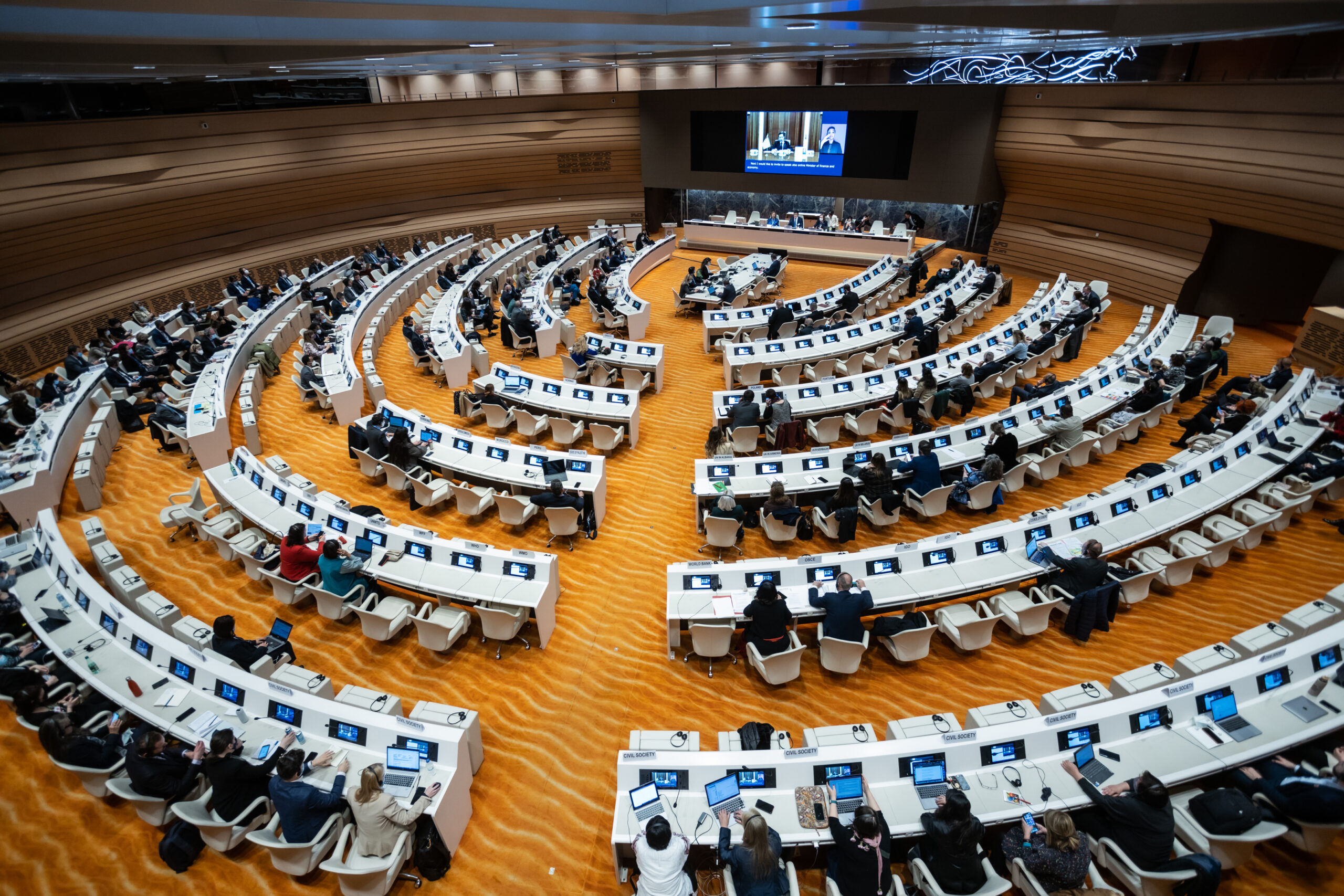
A round table of the Regional Forum on Sustainable Development for the UNECE region | 29 March 2023 from 3 p.m. to 6 p.m. CET | Hybrid format both in presence at conference room XIX, Palais des Nations, Geneva and online | Interpretation in English, French, and Russian.
Approximately 75% of emissions originate from cities, whilst by 2050, urban areas are expected to house over two-thirds of the global population. Cities will therefore play a critical role in the push to achieve sustainable development. Cities are also the site of tackling complex local issues such as housing, energy, transportation, waste and water management, disaster risk reduction, air pollution, population aging, urban mobility, urban food systems, and many others. Returning the famous phrase “Think Global, Act Local” to its origin in urban planning, this session will highlight the multiple levels at which cities operate, from policies and action at the local level driving forward solutions and positive change to forging strategic international partnerships to increase their relevance and impact in global matters. The session will include senior figures from municipal bodies across the region who will share experiences on specific actions and projects undertaken to meet the relevant SDG 11 targets, as well as representatives from international strategic partnerships who will speak to this city-based ‘new multilateralism.’
The roundtable is organized by the UNECE Forests, Land and Housing Division in cooperation with UN-Habitat Geneva Liaison Office and will feature the participation of Dr. Lorenzo Kihlgren Grandi, founding director of the City Diplomacy Lab, a UNECE Center of Excellence on Sustainable Urban Development.
The Regional Forum on Sustainable Development for the UNECE region is a broadly recognized platform that has brought together a growing number of actors and groups since its first stand-alone session in 2017.
Representatives of national and local governments, as well as of civil society, youth, businesses, international and regional organizations, academia, and parliamentarians, will participate in and contribute to the Regional Forum.
To find out more about the Regional Forum, please visit this page.
-
Cities and Climate Solutions | Water
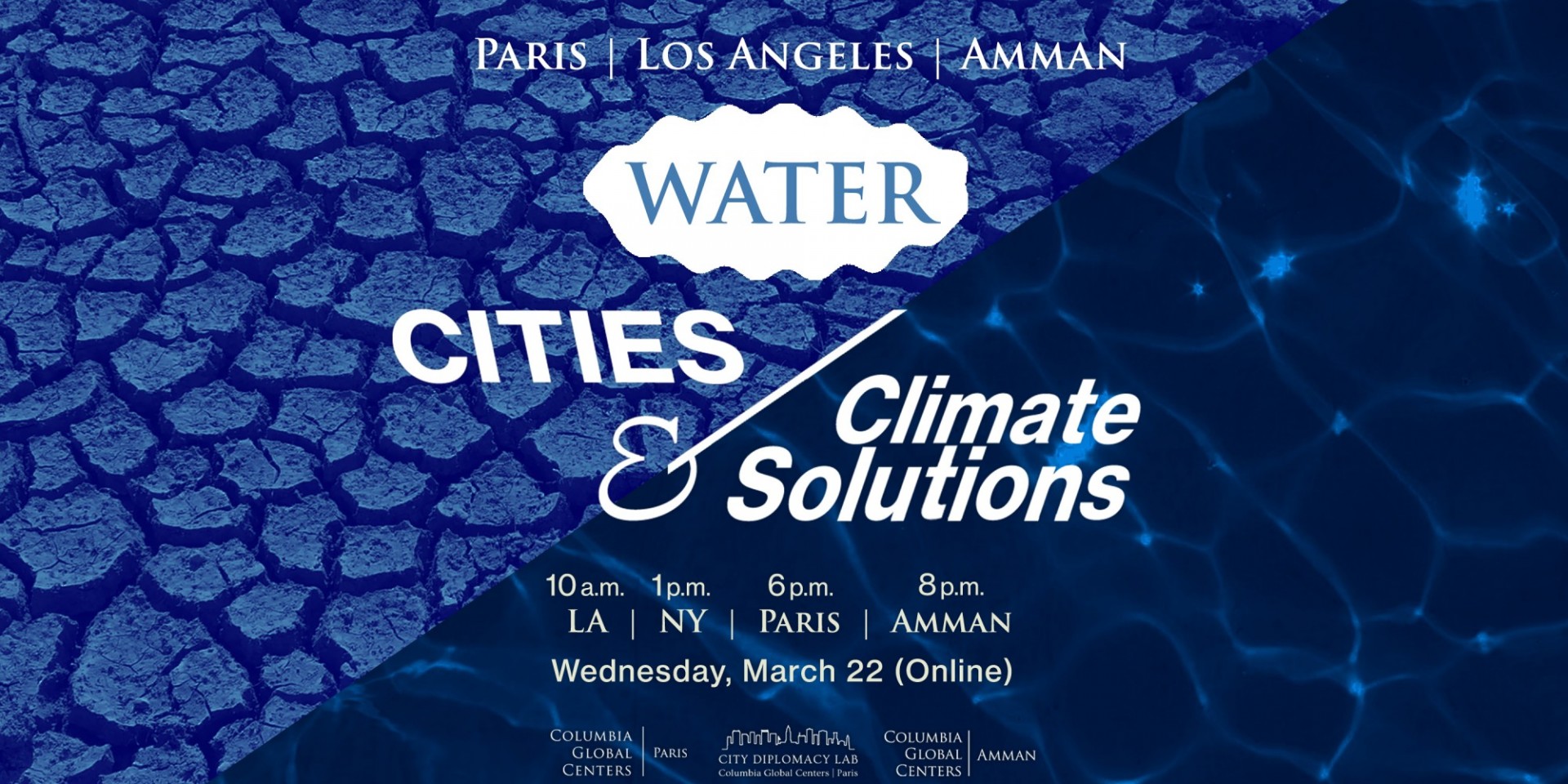
March 22, 2023 | Online event | 10:00 a.m. (Los Angeles) | 1:00 p.m. (New York) | 6:00 p.m. (Paris) | 8:00 p.m. (Amman) | In English
In the face of the climate crisis, cities across the world are emerging as integral problem-solvers in the development of an effective, multi-layered response. This webinar will bring together the representatives of three global cities facing unique water challenges: Los Angeles, Paris, and Amman. How are these cities dealing with (or preparing to deal with) increasingly severe water crises such as drought, floods, and water pollution?
The webinar is the first in a series of three entitled Cities and Climate Solutions. Subsequent webinars will cover food and energy. The series will celebrate the leadership of cities and provide inspiration for the thousands of cities and local governments around the world committed to shaping the global response to climate change.
This series is a collaboration between the City Diplomacy Lab and Columbia Global Centers | Paris.
This event is co-sponsored by Columbia Global Centers | Amman.
-
UNECE recognizes the City Diplomacy Lab as a Center of Excellence
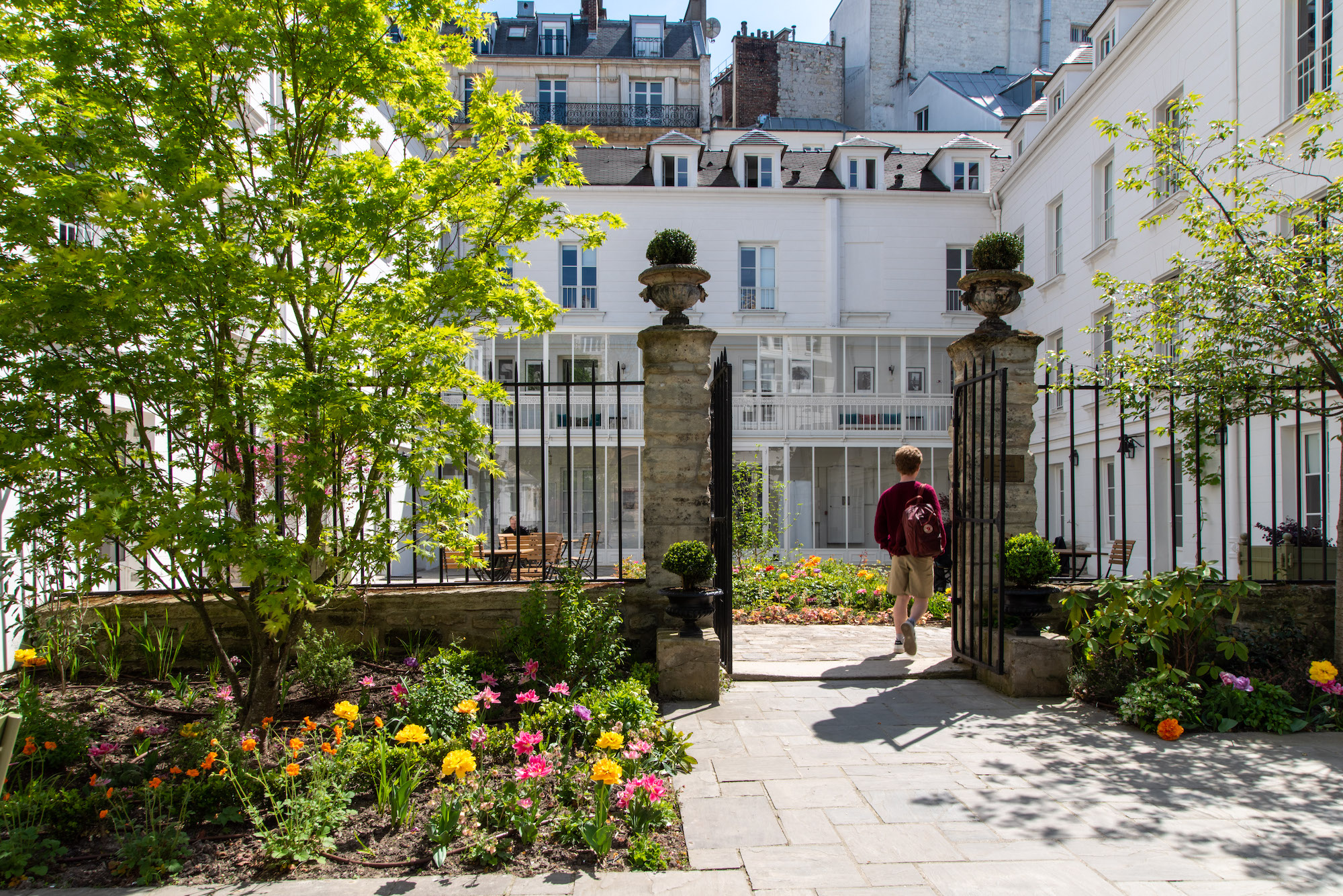
19 January 2023
The United Nations Economic Commission for Europe (UNECE) and Columbia Global Centers | Paris (CGC|Paris), one of the ten global centers of Columbia University in the City of New York, signed a Memorandum of Understanding recognizing the City Diplomacy Lab at CGC|Paris as a UNECE Centre of Excellence in France.
The cooperation between UNECE and the City Diplomacy Lab will contribute to the development and implementation of collaborative activities and projects to promote the principles of the Geneva UN Charter on Sustainable Housing. As a Centre of Excellence, the City Diplomacy Lab will provide municipalities in the UNECE region and worldwide with best practices, research, support, and training in the areas of city diplomacy and smart sustainable urban development.
UNECE Executive Secretary, Olga Algayerova, emphasized: “This is an additional step towards inclusive city diplomacy and multilateralism. We at UNECE are glad to join forces with the City Diplomacy Lab to further reinforce our engagement with cities and look forward to cooperating on critical urban development challenges in the region”.
“We are delighted and honored to have the City Diplomacy Lab recognized by the United Nations as a Centre of Excellence,” said CGC | Paris Director Brunhilde Biebuyck. “With multiple crises affecting urban communities worldwide, city-to-city collaboration is more critical than ever.” City Diplomacy Lab Director Lorenzo Kihlgren Grandi said: “The recognition of City Diplomacy Lab as a Centre of Excellence will help us scale up our efforts in empowering cities to address issues including climate change, rising inequalities, migration, and food insecurity. Today’s challenges are global in nature and primarily urban in impact.”
UNECE and the City Diplomacy Lab will cooperate to support the implementation of Sustainable Development Goals (SDGs), especially SDG 11: to make cities and human settlements inclusive, safe, resilient, and sustainable. The partnership aims to strengthen the capacity of cities to actively contribute to the “more inclusive multilateralism” called for by the Secretary-General of the United Nations, António Guterres, which the UNECE Forum of Mayors is putting into action.
Specific activities that will be undertaken by the City Diplomacy Lab will include training curriculum development; capacity-building and publications on city diplomacy and smart sustainable urban strategies; and the organization and hosting of meetings to disseminate information about UNECE and the Geneva UN Charter at international, national, and subnational levels.
To facilitate the work of the City Diplomacy Lab as a Centre of Excellence, UNECE will encourage the exchange of information, knowledge, and experience within the network, as well as with relevant international and national organizations in the UNECE region and facilitate cooperation and exchange between the Centres of Excellence.
Note to editors
About UNECE
The United Nations Economic Commission for Europe (UNECE) was established in 1947 by the Economic and Social Council (ECOSOC). It is one of five regional commissions of the United Nations.
The major aim of UNECE is to promote pan-European economic integration. UNECE includes fifty-six member States in Europe, North America, and Asia. However, all interested United Nations member States may participate in the work of UNECE. Over seventy international professional organizations and other non-governmental organizations take part in UNECE activities.
For further information on the work of the Committee on Urban Development, Housing and Land Management, please consult http://unece.org/housing/committee.
About Columbia Global Centers | Paris
Columbia Global Centers | Paris is part of a network of ten global centers of Columbia University in the City of New York, one of the world’s leading academic institutions. The centers serve as knowledge hubs that aim to educate and inspire through research, dialogue, and action.
Located at historic Reid Hall, which was gifted to Columbia University in 1964, CGC | Paris partners with regional and international institutions to engage students, faculty, alumni, and the public across borders and disciplines.
For further information on CGC | Paris, please visit https://globalcenters.columbia.edu/paris.
About City Diplomacy Lab
Launched in September 2021, the City Diplomacy Lab is a special project of CGC | Paris that fosters the design and implementation of effective local solutions to the world’s multiple crises. The Lab strives to enhance the understanding and practice of city diplomacy, which forges international collaborations between cities to promote sustainable development and peace while jointly addressing challenges such as climate change, rising inequalities, and migration.
The Lab’s action, which includes applied research, capacity-building, and public programming, is implemented through numerous collaborations with municipalities worldwide, city networks, universities, and international organizations. The Lab also benefits from the resources of the Columbia Global Centers network.
For further information on the City Diplomacy Lab, please visit https://www.citydiplomacylab.net.
-
Celebrating decentralized cooperation projects connecting Europe to the world
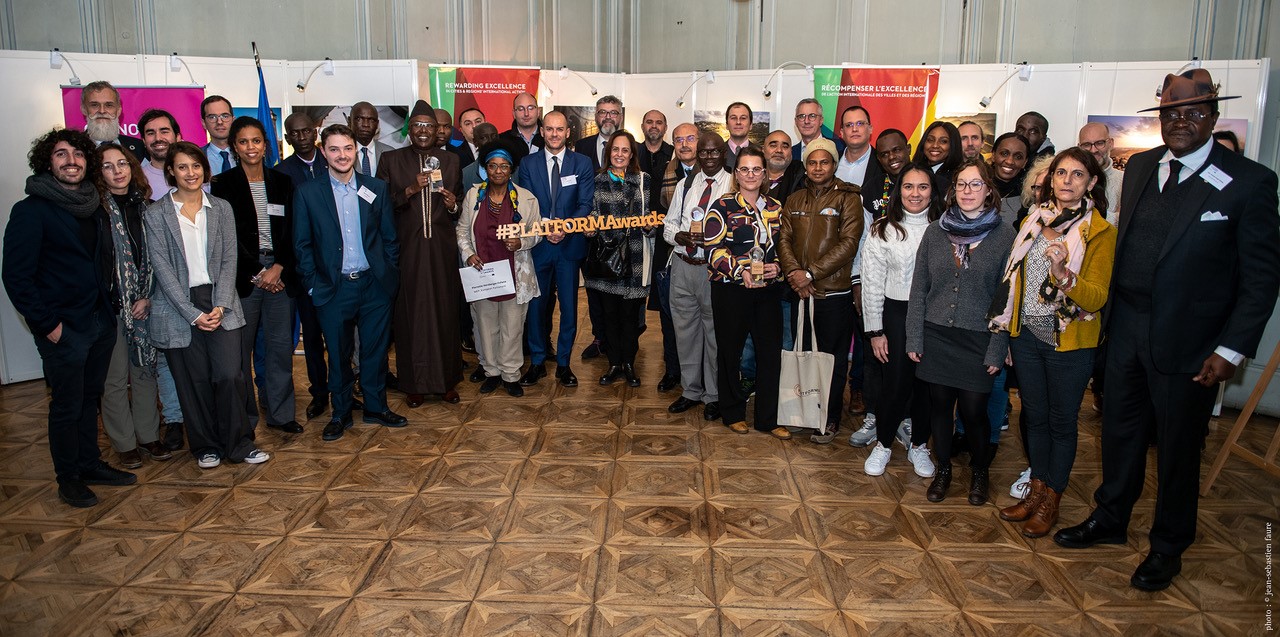
Everywhere in the world, city diplomacy owes its expansion primarily to the determination of a growing number of municipalities to emulate the impact of its most successful applications.
This is particularly true in the context of decentralized cooperation, a term for the wide range of partnerships through which cities collaborate internationally to further the development of areas of the world most in need.
In a global context where inequalities within and across national borders are sharpening considerably, it seems particularly useful to identify and celebrate methodologies that have stood out for their impact on the ground so that they can help guide the evolution of this practice.This is precisely why PLATFORMA, the platform dedicated to development cooperation promoted by the Council of European Municipalities and Regions and supported by the European Union, organizes the PLATFORMAwards. This annual prize aims to identify and celebrate the best practices of decentralized cooperation fostering the realization of the 2030 Agenda jointly implemented by European local communities and those in partner countries in Africa, Asia, Latin America, Eastern Europe, and the Middle East.
The award ceremony for the third edition of the prize was held on December 6, 2022, in Grenoble, France.
As explained by Dr. Lorenzo Kihlgren Grandi, City Diplomacy Lab director and PLATFORMAwards jury member, the awarded projects owe much of their success to their “proven ability to actively engage the residents that benefit from them. The latter, far from being mere recipients, become true partners in the project’s design and implementation.”
These are the 2022 winners:
1st prize: Belgian Federal Programme for Communal International Cooperation (PCIC) between Anderlecht (Belgium) and Marsassoum (Senegal).
This is the second phase of a program begun in 2017 aimed at simultaneously strengthening inclusive local economic development and municipal governance in Marsassoum. Its implementation rests on a meticulous application of the multi-actor principle of action in both cities.
2nd prize: Rehabilitation of infrastructure and the strengthening of the economic activity of spirulina production between Zaragoza (Spain) and Ouonck (Senegal).
The project is a virtuous example of co-development. This cooperation methodology involves migrants in order to foster integration in the community of residence and the sustainable development of their community of origin.
3rd prize: Unesco Heritage for Sustainable Cities between Haskovo (Bulgaria) and Douala 1st (Cameroon)
The project was able to advance sustainable development through a broad strategy that systematizes and adapts to the local context some of the most innovative methodologies developed internationally in the areas of preservation and enhancement of tangible and intangible heritage, participatory budgeting, support for cultural and creative industries, and sustainable smart city.
Special prize: EU-Ukraine partnerships
The jury also decided to award a special prize to all Ukrainian and European local and regional administrations currently engaged in collaboration. The more than 700 pre-war European and Ukrainian local and regional government partnerships there are facts and have multiplied since its outbreak last February.
Every year, the evaluation of PLATFORMAwards’ shortlisted projects is made by an international jury of European elected officials and city diplomacy professionals. This is the composition of the 2022 jury:
- Mr. Fabrizio ROSSI, Secretary General of CEMR, president of the jury
- Dr. Pierrette HERZBERGER-FOFANA, MEP, First Vice-Chair of the European Parliament’s Committee on Development (DEVE)
- Mr. Emmanuel CARROZ, Deputy Mayor in charge of International Cooperation and Europe, City of Grenoble (France)
- Ms. Pilar DIAZ ROMERO, Mayor of Esplugues de Llobregat and Deputy to the Presidency, responsible for international relations, Diputació de Barcelona (Spain)
- Ms. Gertrude Nadia Sèna DOSSA, Mayor of the 2nd district of Porto Novo (Benin), United Cities and Local Governments Africa
- Dr. Lorenzo KIHLGREN GRANDI, Director, City Diplomacy Lab at Columbia Global Centers | Paris
- Mr. Alessandro DA ROLD, Director General, EU40 (Network of Young European Parliamentarians)
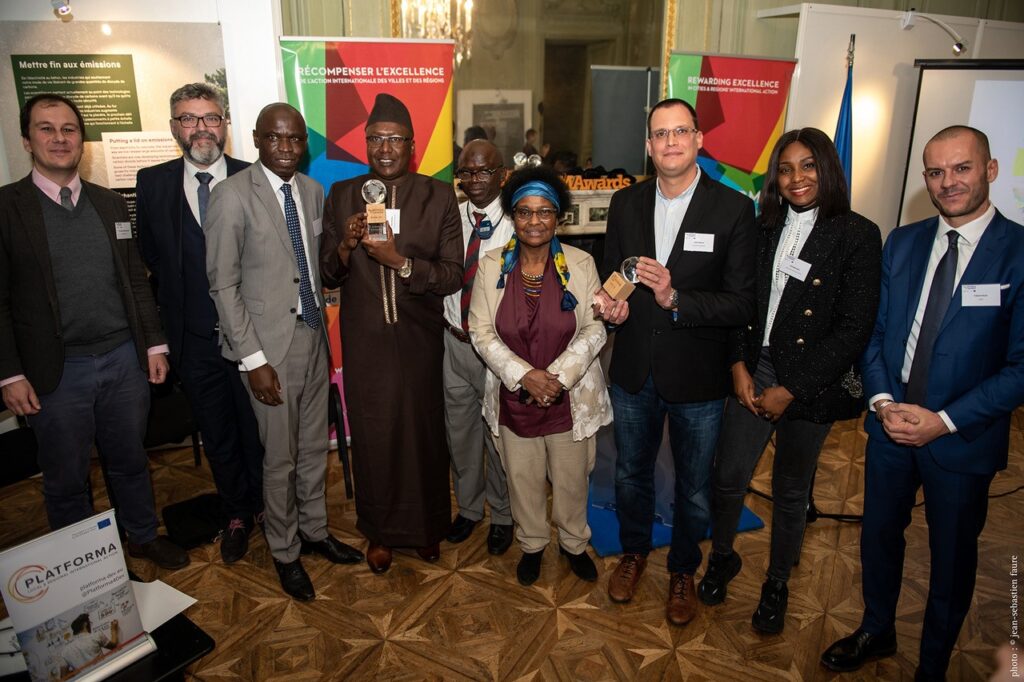
2022 PLATFORMAwars winners and jury members For more information about the prize and how to apply for future editions, visit the dedicated website.
-
Shaping the future of Italian cities’ international action

Since its dawn following World War II, city diplomacy has featured Italian municipalities among its main drivers of expansion and innovation. Twinning agreements, the municipal peace movement, the partnership approach to international cooperation, and, more recently, solidarity related to the pandemic crisis and the war in Ukraine have seen Italian cities as prominent advocates.
A such international commitment of Italian cities rests on two particularities. First, its convincingly participatory approach stems from the involvement of a broad spectrum of local actors. Second, the international outlook is manifested by a considerable amount of small and medium-sized centers. These dynamics are all the more remarkable considering the overall absence of a national strategy to coordinate and support city diplomacy, in contrast to countries such as France and, most recently, the United States.
For some time, however, a determination to give further impetus to Italian city diplomacy seems to be emerging in various national instances.
To discuss this, a wide-ranging panel discussion took place at the 39th assembly of the National Association of Italian Municipalities (ANCI) on November 22 in Bergamo, Italy, featuring the participation of City Diplomacy Lab’s director Lorenzo Kihlgren Grandi. Strong determination was expressed by the various mayors, including host Giorgio Gori and Parma’s Michele Guerra, to support the spread of city diplomacy as a pillar of municipal action, enabling more and more small and medium-sized Italian municipalities to benefit from it.The appeal received the enthusiastic support of ANCI itself, the Italian Agency for Development Cooperation, and the City Diplomacy Lab, which announced their determination to support such nationwide uptake of the practice through capacity-building activities. The three institutions aim at reporting the first outcomes of such an agenda at the 2023 edition of the Italian municipalities’ annual assembly.
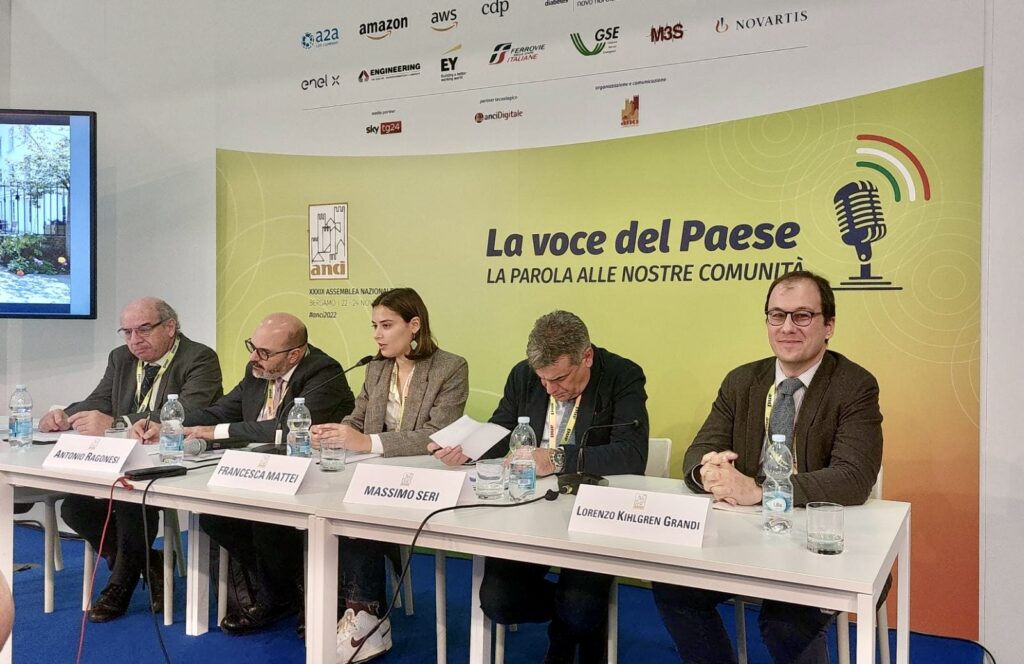
-
Scaling up diasporas’ unique contribution to decentralized cooperation
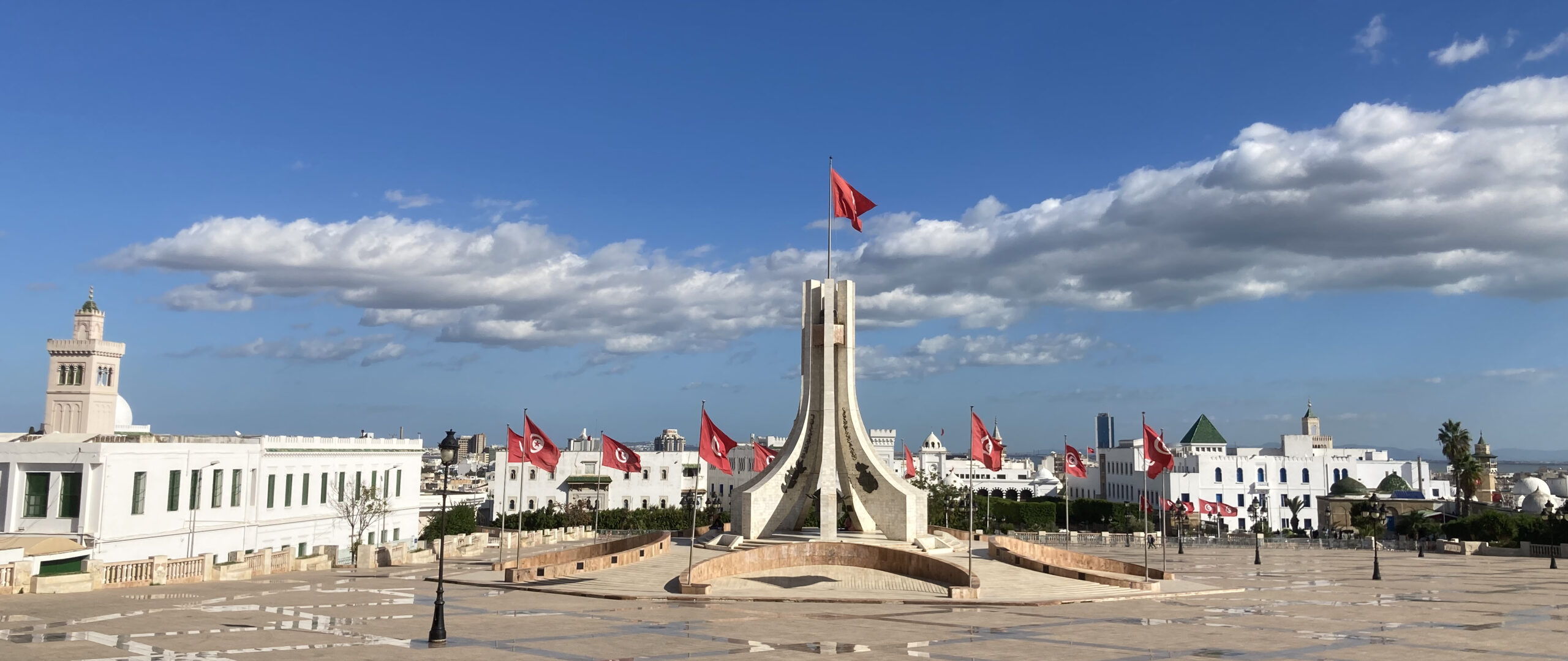
Diasporas are increasingly proving their empowering role in decentralized cooperation, i.e., development partnerships implemented by cities and local governments.
With their knowledge of their territory of origin and ability to mediate between two cultures, diasporas’ contribution to designing and implementing such projects is unparalleled.
So how can this practice be strengthened and spread to the height of its potential contribution to international cooperation?
This question prompted City Diplomacy Lab, AIMF, and the Municipality of Tunis to organize this workshop on November 17 at Tunis City Hall. The keystone time of the day will be a dialogue between local elected officials and experts from cities in the Maghreb with European colleagues of Maghrebi origin.
